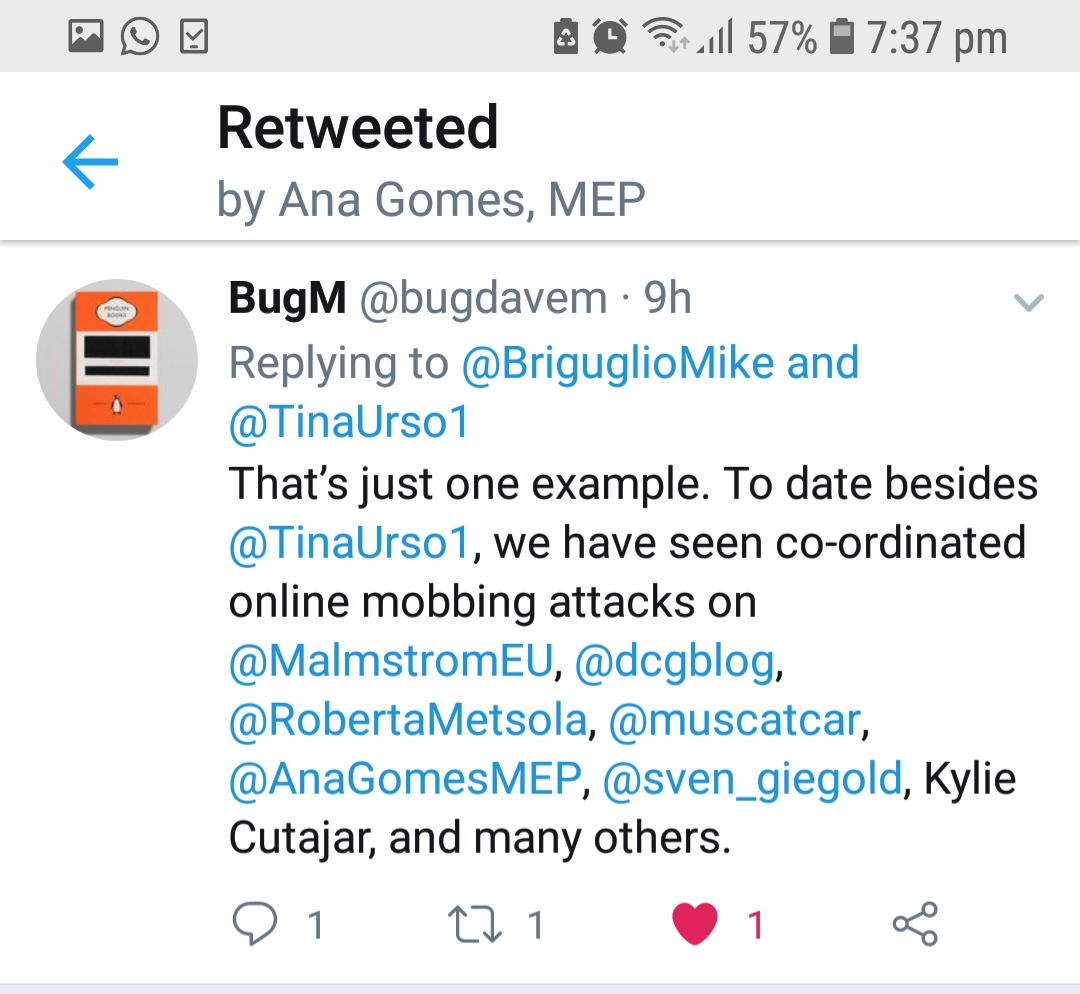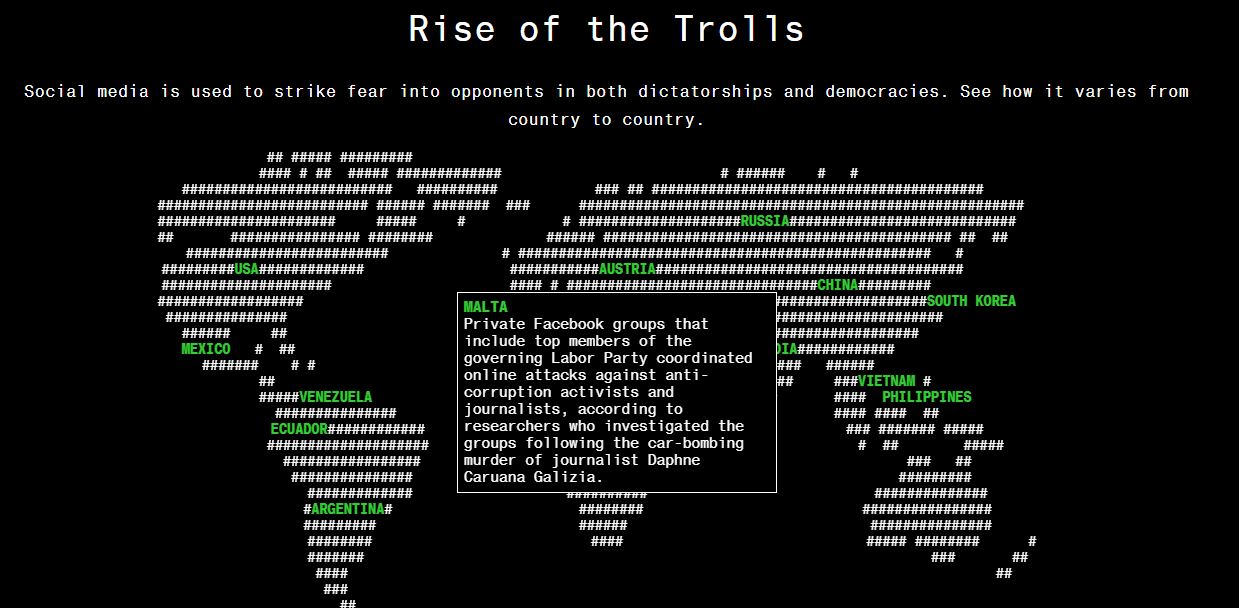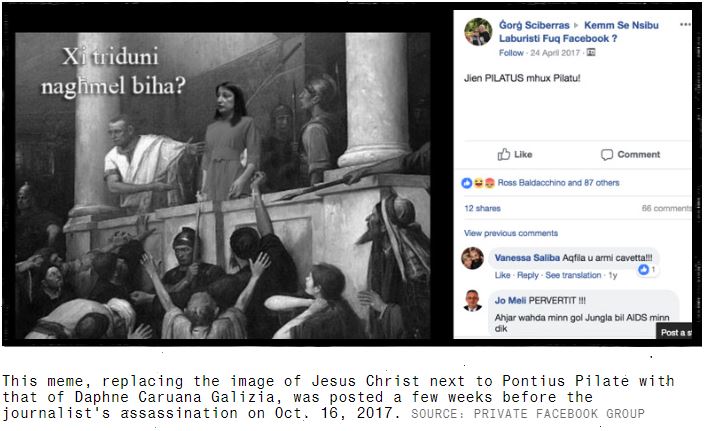Every identified instance of state-sponsored trolling involving female victims used heavily misogynistic language, including threats of rape and physical violence, according to a report by The Institute for the Future.
A feature on the report by news site Bloomberg included Malta as a case study, showcasing an example of state trolling on Tina Urso, a member of activist group il-Kenniesa, who was a victim of online abuse following a protest she had organised in London in April during a visit by Prime Minister Joseph Muscat.
The protest aimed to create awareness about Malta’s passport scheme and the money laundering it “engendered”. However, by the time she woke up, “her Facebook feed was deluged with threats of violence and misogynist insults, including the fake charge that she ran an escort service”.
Her home address in Malta – where her parents still lived – together with her ID number were also published. “My Facebook account was flooded with notifications, people sharing everything about me, manipulating photos taken from my profile. It was just insane what they were able to do in just a few hours,” she told Bloomberg.
The trolling was condemned on Twitter as it was pointed out that Urso was among a number of Maltese women who suffered from online abuse.

Researchers concluded the attacks were coordinated through private Facebook groups administered by government employees and officials of Malta’s ruling Labour Party, the article said.
The report was drawn up by a global group of researchers that uncovered evidence of state-sponsored trolling in seven countries by the Institute for the Future, a non-partisan, foresight research and public policy group based in Palo Alto, California.
Bloomberg reporters documented additional examples in several others – including Malta – and highlighted the online trolling that focused on journalist Daphne Caruana Galizia who, before her assassination, was bombarded by violent and hateful comments for the articles she wrote exposing corruption in Malta.

Photo: Bloomberg report: a global guide to state sponsored trolling
Her son Paul said that, before her murder, she had become “so “ anxious about the online attacks that greeted her blog posts that she often hesitated before publishing a new one”.
These graphic, relentless posts often prove to be powerful weapons, publicly singling out a regime’s opponents and legitimizing those who attack them, while leading some journalists to self-censor their reporting, according to the report.
Some of the most virulent attacks are aimed at women.
The hate comments against Caruana Galizia were published inside a handful of private Facebook groups run by government employees and senior government and Labour Party officials.
The secret groups, who were revealed by The Shift News team in the months following her death, circulated “thousands of really horrifically abusive comments” against his mother, he said.

Photo: Bloomberg guide to state sponsored trolling report
The article featured a meme portraying a biblical scene where she stood next to Pontius Pilate – instead of Jesus Christ – who asked the crowd: “What do you want me to do with her?”. Disparaging and hateful comments inciting violence were published below it. “The dehumanization by the time she was killed around that period was complete,” her son said.
The researchers also referred to the online trolling Turkish journalist Ceydan Karan had to face as people threatened to sexually abuse her with a broken bottle while Mexican scholar Rossana Reguillo was sent pictures of burned bodies with the warning, “This could happen to you.”
The fact that the threats are designed to look like they are coming from crowds of anonymous social media users makes them more ominous in some cases than if they had been issued directly by the government, the article said.
However, tracing the fingerprints of state-sponsored trolling remains a difficult task, largely because states go to great lengths to cover tracks. A former Google researcher compared the architecture of a trolling campaign to a hand inside a glove that organizes an action and then is removed.
While the glove is left behind for the world to see, the “hand simply disappears”.
Only a few years after Twitter and Facebook were celebrated as the spark for democratic movements worldwide, states and their proxies are hatching new forms of digitally enabled suppression that were unthinkable before the age of the social media giants, according to evidence collected from computer sleuths, researchers and documents across more than a dozen countries.
Through combining virtual hate mobs, surveillance, misinformation, anonymous threats, and the invasion of victims’ privacy, states and political parties around the globe have “created an increasingly aggressive online playbook that is difficult for the platforms to detect or counter”.
States are using the same tools they once “perceived as a threat to deploy information technology as a means for power consolidation and social control, fueling disinformation operations and disseminating government propaganda at a greater scale than ever before.”
In response to revolutions and social movements launched on Twitter and Facebook, national governments initially censored content, blocked access to social media and used surveillance technology to monitor their citizens. However, the report pointe out that it turned out to be far more effective to simply “inundate the platforms” with a torrent of disinformation and anonymized threats—what the researchers dubbed a strategy of “information abundance” made possible by the rapid spread of social media.
In May and June, Twitter reportedly suspended 70 million fake and malicious accounts, saying it took preventive measures to address trolling and that any form of malicious automation is a violation of Twitter rules. Facebook announced this week that it will begin removing misinformation that serves to incite violence, and a spokesman said it has invested in more effective ways to fight fake accounts. “
The report highlighted a series of common elements in state-sponsored trolling across countries, which include making death and rape threats, using bots and automated agents to amplify vitriolic attacks at scale, making accusations of treason or collusion with foreign intelligence agencies, using “black” public relations firms to disseminate hyperpartisan or libelous disinformation about targets, spreading doctored images and memes, unlawfully using spyware and hacking.
One doesn’t need to look far from home as online hate groups had criticised the three Maltese MEPs as traitors when they spoke in the European Parliament against the corruption of Tourism Minister Konrad Mizzi and chief of staff Keith Schembri.
“The goal of these attacks is the intimidation and silencing of targeted individuals—most often journalists, activists, human rights defenders, and vocal members of opposition coalitions,” the report said.
Disinformation was also mentioned as a tool used by governments as part of state-sponsored campaigns within a sustained, coordinated effort to harass and silence critics.
One way to tackle state-trolling was to expand the understanding and definitions of unprotected hate speech under international law to include the types of online harassment and hate speech deployed as part of state-sponsored trolling attacks. Also, there was the need for more responsibility for technology companies to detect and identify state linked accounts, bots, and hateful online content.












